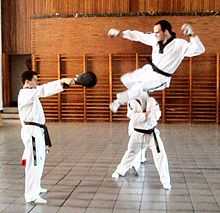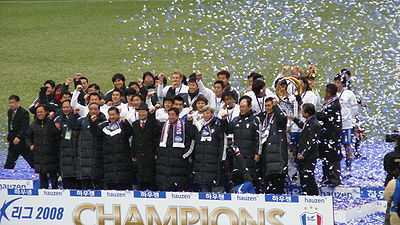Sport in South Korea
South Korea has traditional sports of its own, but sports imported from the West are predominant.
Traditional sports

There are various forms of folk dancing still practiced in Korea. Although not commonly considered a sport, traditional mask dance drama is physically demanding.
Kite flying (Yeon Nalligi) is considered a sport in East Asia. Kites are flown during the first few days of the Lunar New Year and Chuseok. It is not, however, a major league sport as it is in Thailand. The traditional Korean kite is made of bamboo sticks and traditional Korean paper.
Bull fighting (So Ssaum) in Korea features two bulls fighting each other. The bulls butt heads and attempt to push the opponent backwards. The first bull to move backwards loses the game. Many people tip on bulls that they think are going to win. The owner of a bull named Glamorous made 1.2 million dollars from tipping alone.
Korean wrestling (Ssireum) is similar to Sumo wrestling from Japan. Korean wrestling is played in a sandy ring, and the contender who throws his opponent to the ground wins a point.
Sports originating from Korea
Taekwondo, a popular martial art originated in Korea. Taekwondo means technique of kicking and punching, although the emphasis lies on the kicks. Even though it was practiced for centuries—its origins have been traced as far back as the 1st century BC—it only became popular after World War II. It became standard military training in Korea, and in 1961 the rules were standardized.
Taekkyeon is a traditional martial art that originated in Korea during the Goguryeo period in the 4th century. It uses open hands and the feet, where as the use of clenched fists is not permitted. The motions are smoother and more curvilinear than Taekwondo.
Hapkido is another martial art from Korea, although not as popular as Taekwondo outside the peninsula. Hapkido developed during the Three Kingdoms and shares many characteristics with the Japanese Aikido..
Popular sports

Football has traditionally been regarded as the most popular sport in Korea.[1] Recent polling indicates that a majority, 41% of South Korean sports fans continue to self-identify as football fans, with baseball ranked 2nd at 25% of respondents. However, the polling did not indicate the extent to which respondents follow both sports.[2] The national football team became the first team in the Asian Football Confederation to reach the FIFA World Cup semi-finals in the 2002 FIFA World Cup, jointly hosted by South Korea and Japan. The Korea Republic national team (as it is known) has qualified for every World Cup since Mexico 1986, and has broken out of the group stage twice: first in 2002, and again in 2010, when it was defeated by eventual semi-finalist Uruguay in the Round of 16. At the 2012 Summer Olympics, South Korea won the Bronze Medal for football.
South Korea, which competes internationally under the name of "Korea Republic", has qualified for nine FIFA World Cups including the most recent 2014 tournament (Asian record), and co-hosted the 2002 World Cup, finishing in 4th place. Also in 2010, the country's under-17 women's team won the 2010 FIFA U-17 Women's World Cup in Trinidad and Tobago, claiming South Korea's first-ever title in worldwide FIFA competition. The K-League is the oldest domestic professional football league in Asia. A huge number of tiny amateur football gatherings are active and immensely popular.
Baseball is another one of the most popular sports in South Korea. It was introduced in 1905 by American missionaries and carries a strong following today. Professional teams owned by large conglomerates (chaebols) compete in the Korea Professional Baseball league. Korea won the Gold Medal in baseball at the 2008 Olympic Games. Korea is also a regular participant in the World Baseball Classic, and is considered one of the best baseball countries in international competition. Several Korean players have gone on to play in Major League Baseball.

Another sport gaining popularity in South Korea is basketball. Professional basketball teams compete in the Korean Basketball League. The South Korea national basketball team won a record number of 23 medals at the Asian Basketball Championship. The only Korean NBA player to date has been Ha Seung-Jin who played there in 2005-06. Another prominent Korean basketball player is Moon Tae-Jong who appeared at the 2005 and 2006 FIBA EuroCup All-Star Day.
Ice Hockey is slowly emerging as fans in Anyang city sees sell-out games for Anyang Halla hockey club, which became the first non-Japanese club to win the championship title for Asia League Ice Hockey. South Korea has 4 teams participating in the Asia League Ice Hockey championship.
Popular throughout Asia, Badminton is played by many Koreans. Badminton nets can be found in many outdoor recreation parks. Korean players often reach the finals in regional and world championships. Bowling is a popular sport in South Korea, with many local leagues. Computerized systems are commonplace.

Fishing and hiking are common activities in South Korea. Fishing is popular in streams, rivers, and the oceans. There are arranged fishing tours. Hiking in the Korean mountains is very popular, and weekend after weekend popular areas fill with people.
Golf is very popular in South Korea. It is often thought that this is linked to the fact that golf is considered a status symbol. Membership in golf clubs in South Korea is considerably more expensive than in Japan or the US. South Korea is especially strong in women's golf; 47 Koreans play on the world's leading women's tour, the LPGA tour in the [United States]. The best-known Korean golfer is Pak Se-ri.
Scuba diving is popular on Jeju island.
Korea is home to a number of good downhill skiing slopes. Snowboarding was not allowed in most resorts until recently.. Ice skating is also a very popular sport which sees kids even as young as 5 years old starting to compete and getting private coaching on a daily basis.
Rugby union is Rugby union in South Korea played to some degree in South Korea, with the Korean team being currently ranked 24th in the world (as of March 2015) in the current IRB world rankings. Korea have been participating in the Asian Five Nations since 2008 with a 3rd place finish in 2014. Most of South Korea's national rugby team players play their club rugby in Japan as South Korea doesn't have a professional league. South Korea are also competing in the current Rugby sevens world league hoping to qualify for the 2016 Olympic Games.
Cricket is not that common but, South Korea did enter a national side during the 2014 Asian Games which saw them beat the People's Republic of China. Cricket is mostly played by expats and only a league exists in Seoul and surrounding suburbs.
Table tennis is popular in South Korea. There are minor leagues in many universities.
E-sports have found a strong home in South Korea, StarCraft professional competition being the largest example of these. Major corporate sponsored teams and leagues have formed in e-Sports, the most notable leagues being the OnGameNet Starleague, the MBCGame StarCraft League (retired), and Proleague. Some television stations are devoted to broadcasting electronic sports, such as Ongamenet, GomTV, and formerly MBCGame.
South Korea has hosted the annual Formula One Korean Grand Prix in Yeongam from 2010 until 2013. However, South Korea has yet to have a driver on the grid.
Major sport events
Olympic Games
The 1988 Summer Olympics were celebrated in Seoul from September 17 to October 2, 1988. They were the second summer Olympic Games to be held in Asia and the first since the 1964 Summer Olympics held in Tokyo, Japan.
In the Seoul Games, 160 nations were represented by a total of 8391 athletes: 6197 men and 2194 women. 237 events were held. 27221 volunteers helped to prepare the Olympics. 11331 media (4978 written press and 6353 broadcasters) showed the Games all over the world.
These were the last Olympic Games for two of the world's "dominating" sport powers, Soviet Union and East Germany, as both ceased to exist before the next Olympic Games.
North Korea, still officially at war with South Korea, and its allies, Albania, Cuba, Madagascar and Seychelles boycotted the games. For differing reasons, Ethiopia, Nicaragua, and Albania (who declared an Olympic-record fourth consecutive boycott) did not participate in the Games. However, the much larger boycotts seen in the previous three Summer Olympics were avoided, resulting in the largest ever number of participating nations to that date.
North Korea and South Korea marched together in the 2000 and 2004 Olympics, and were likely to do so again in 2008, however they did not. (See Sports in North Korea.)
The 2018 Winter Olympics is scheduled to take place in Pyeongchang between 9 and 25 February 2018. Pyeongchang won on its third consecutive bid. After a series of large cities (Nagano to Sochi), for the first time since Lillehammer 1994 the Winter Olympics returned to a mountain resort.
FIFA World Cup
The 2002 FIFA World Cup was held in Korea and Japan with extreme success. More than 10 million Koreans came to the streets to support their team in the semifinals against Germany.
The 2002 FIFA World Cup was the 17th staging of the FIFA World Cup, held in South Korea and Japan from 31 May to 30 June. It was also the first World Cup held in Asia, and the last in which the golden goal rule was implemented. Brazil won the tournament for a record fifth time, beating Germany 2–0 in the final. Turkey beat South Korea 3–2 in the third place match.
Korea professional sports
|
|
|
|
|
|
Ice Hockey
|
Mixed Martial Arts
|
E-Sports
|
International Championship Host
|
|
|
|
|
|
|
|
References
- ↑ "하는 운동 ´걷기´, 보는 운동 ´축구´, 하려는 운동 ´수영´". EBN. 2009-08-19. Retrieved 2013-08-10.
- ↑ "한국갤럽조사연구소". Gallup.co.kr. 2009-05-20. Retrieved 2013-08-10.
- ^ "Kite Flying as a Sport". Britannica Student Encyclopedia (Online ed.). 2005.
- ^ "Sport". Retrieved July 23, 2005.
- ^ "Korea: Education, Recreation, and Welfare". Britannica Student Encyclopedia (Online ed.). 2005.
- ^ "Traditional Sports and Games". Retrieved July 23, 2005.
- ^ Korean Folk Village (2000). Korean Traditional Culture: Scents of Korean Traditional Culture. Lee Sang-So. ISBN 89-951216-2-9.
- ^ "Martial art: Taekwondo". Encyclopædia Britannica (Online ed.). 2005.
- ^ "Seoul 1988". www.olympic.org. Retrieved March 12, 2010.
| |||||||||||||||||||||||||||||
| ||||||||||||||
